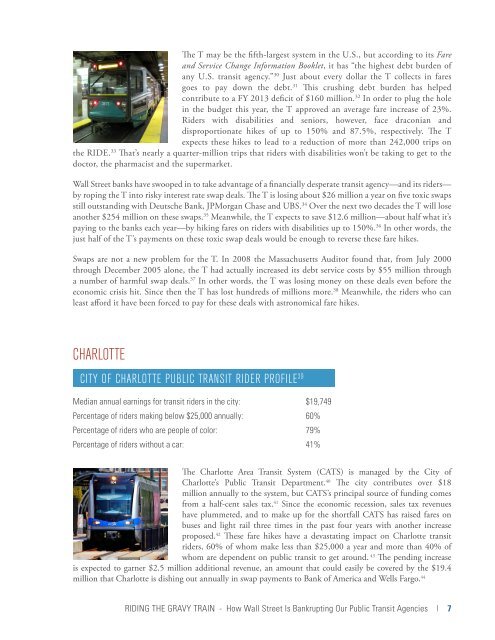Riding the Gravy Train - ReFund Transit
Riding the Gravy Train - ReFund Transit
Riding the Gravy Train - ReFund Transit
Create successful ePaper yourself
Turn your PDF publications into a flip-book with our unique Google optimized e-Paper software.
The T may be <strong>the</strong> fifth-largest system in <strong>the</strong> U.S., but according to its Fare<br />
and Service Change Information Booklet, it has “<strong>the</strong> highest debt burden of<br />
any U.S. transit agency.” 30 Just about every dollar <strong>the</strong> T collects in fares<br />
goes to pay down <strong>the</strong> debt. 31 This crushing debt burden has helped<br />
contribute to a FY 2013 deficit of $160 million. 32 In order to plug <strong>the</strong> hole<br />
in <strong>the</strong> budget this year, <strong>the</strong> T approved an average fare increase of 23%.<br />
Riders with disabilities and seniors, however, face draconian and<br />
disproportionate hikes of up to 150% and 87.5%, respectively. The T<br />
expects <strong>the</strong>se hikes to lead to a reduction of more than 242,000 trips on<br />
<strong>the</strong> RIDE. 33 That’s nearly a quarter-million trips that riders with disabilities won’t be taking to get to <strong>the</strong><br />
doctor, <strong>the</strong> pharmacist and <strong>the</strong> supermarket.<br />
Wall Street banks have swooped in to take advantage of a financially desperate transit agency—and its riders—<br />
by roping <strong>the</strong> T into risky interest rate swap deals. The T is losing about $26 million a year on five toxic swaps<br />
still outstanding with Deutsche Bank, JPMorgan Chase and UBS. 34 Over <strong>the</strong> next two decades <strong>the</strong> T will lose<br />
ano<strong>the</strong>r $254 million on <strong>the</strong>se swaps. 35 Meanwhile, <strong>the</strong> T expects to save $12.6 million—about half what it’s<br />
paying to <strong>the</strong> banks each year—by hiking fares on riders with disabilities up to 150%. 36 In o<strong>the</strong>r words, <strong>the</strong><br />
just half of <strong>the</strong> T’s payments on <strong>the</strong>se toxic swap deals would be enough to reverse <strong>the</strong>se fare hikes.<br />
Swaps are not a new problem for <strong>the</strong> T. In 2008 <strong>the</strong> Massachusetts Auditor found that, from July 2000<br />
through December 2005 alone, <strong>the</strong> T had actually increased its debt service costs by $55 million through<br />
a number of harmful swap deals. 37 In o<strong>the</strong>r words, <strong>the</strong> T was losing money on <strong>the</strong>se deals even before <strong>the</strong><br />
economic crisis hit. Since <strong>the</strong>n <strong>the</strong> T has lost hundreds of millions more. 38 Meanwhile, <strong>the</strong> riders who can<br />
least afford it have been forced to pay for <strong>the</strong>se deals with astronomical fare hikes.<br />
CHARLOTTE<br />
CITY OF CHARLOTTE PUBLIC TRANSIT RIDER PROFILE 39<br />
Median annual earnings for transit riders in <strong>the</strong> city: $19,749<br />
Percentage of riders making below $25,000 annually: 60%<br />
Percentage of riders who are people of color: 79%<br />
Percentage of riders without a car: 41%<br />
The Charlotte Area <strong>Transit</strong> System (CATS) is managed by <strong>the</strong> City of<br />
Charlotte’s Public <strong>Transit</strong> Department. 40 The city contributes over $18<br />
million annually to <strong>the</strong> system, but CATS’s principal source of funding comes<br />
from a half-cent sales tax. 41 Since <strong>the</strong> economic recession, sales tax revenues<br />
have plummeted, and to make up for <strong>the</strong> shortfall CATS has raised fares on<br />
buses and light rail three times in <strong>the</strong> past four years with ano<strong>the</strong>r increase<br />
proposed. 42 These fare hikes have a devastating impact on Charlotte transit<br />
riders, 60% of whom make less than $25,000 a year and more than 40% of<br />
whom are dependent on public transit to get around. 43 The pending increase<br />
is expected to garner $2.5 million additional revenue, an amount that could easily be covered by <strong>the</strong> $19.4<br />
million that Charlotte is dishing out annually in swap payments to Bank of America and Wells Fargo. 44<br />
RIDING THE GRAVY TRAIN - How Wall Street Is Bankrupting Our Public <strong>Transit</strong> Agencies | 7


